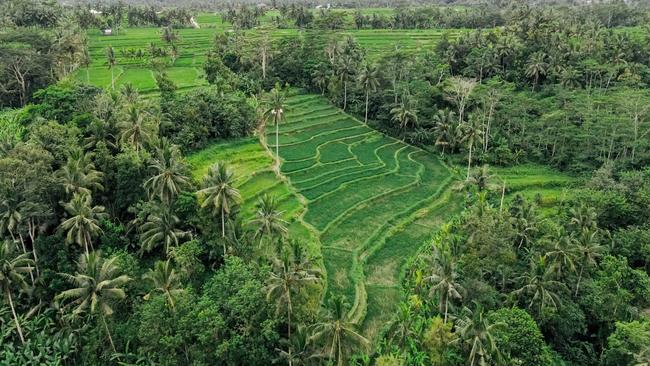Perhaps more than anywhere else on this Earth, wellness is next to godliness in Ubud. The district in central Bali is a pastiche of cacophony and calm, contrast and contradiction. Despite its spiritual presence – there’s a Hindu temple on every corner – Ubud can be as maddeningly congested as Seminyak.
Ever since 2010’s Eat Pray Love, in which Julia Roberts pedalled through the rice fields in search of enlightenment and entanglement, Ubud has basked in global acclaim. It is, at once, a sacred place, an artistic hub and a buzzy bolthole, home to a renowned writers’ festival and a respected antique shop strip. More recently, Ubud has morphed into the well-being mecca, with a plethora of yoga studios, spa clinics and virtuous cafés dishing up shiitake burgers and vegan pizzas – more than you could shake a smudge stick at.
–
Looking to reboot and relax? Discover life-changing wellness retreats and restorative getaways in the latest edition of Travel + Luxury magazine.
–
Like the rice fields, renewal and rejuvenation has tiers. Venture 15 minutes from the town and it’s still possible to discover Zen solitude – to eat, pray and unwind in peace. The area’s spiffiest lodgings, set atop a leafy gorge, cantilever over the Ayung River, yet only one expertly combines holistic and hedonistic tenets.
Health-seeking pilgrims have gravitated to Como Shambhala Estate for almost two decades, longing for revivification, self-actualisation or respite from emotional whiplash, and the years have done nothing to dull its lustre. Embedded in untamed jungle, the retreat feels untouched by age and eternally alluring. One hazy morning, I was bedazzled as bright-red dragonflies zipped through the emerald foliage and skimmed the opalescent infinity-edged pool of my villa. Heady notes of frangipani and jasmine perfumed the air, and the mighty river echoed below.
When I landed the previous evening, the dusk light glowed over teak furnishings, copper sinks, and a sprawling platform bed elegantly draped in netting. An amphibious chorus of frogs lulled me into a deep slumber. After globetrotting for escapism, cultural pursuits and endless rounds of social occasions, it was time to curtail the wanderlust to focus on, well, me.
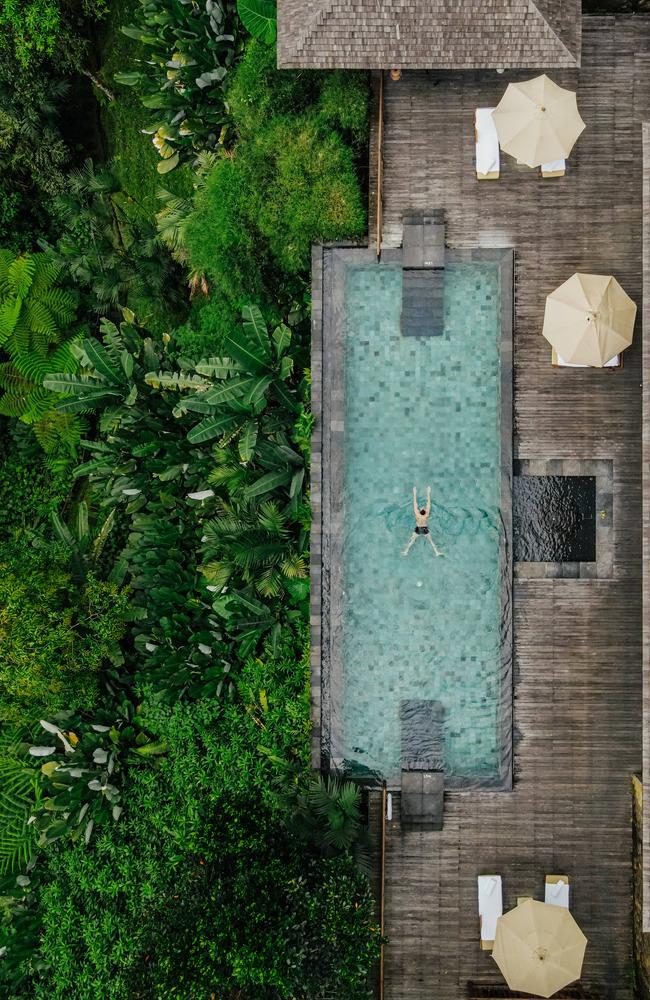
Unsurprisingly given dire world events, wellness travel is booming. The pandemic scrambled our lives, scuttled our plans and left us feeling as flat as papadams. The idea of a mental, physical and spiritual reset, the holy trinity of healing, is more appealing than ever before. It almost feels crucial.
Countless hotels are laying out the green carpet for guests in search of transformative experiences – from cryotherapy to fire cupping – but few do it with the flair of Como resorts. The Singapore-based group helmed by Christina Ong has expanded its wellness philosophy to all its hotels, stretching from Perth to Bhutan, yet Shambhala Estate remains the mothership with a fiercely devoted following. That’s because wellness is not an addendum here. It’s the raison d’être that instils every element of your stay – from its name (“place of tranquillity” in Sanskrit) to its five tony residences, housing 30 suites, enfolded in tropical verdure. A handful of standalone villas have either private pools or treatment rooms.
Como’s program is rooted in Ayurveda, the ancient system of healing from India, which sets it apart from many of its competitors. Ayurveda’s core concept is that optimal health requires harmony between mind, body and consciousness. As the three doshas or energies – vata (air), pitta (fire), and kapha (water) – move in and out of balance, your well-being, energy levels, and overall disposition are impacted. But what can a practice that originated close to 3000 years ago offer us now?
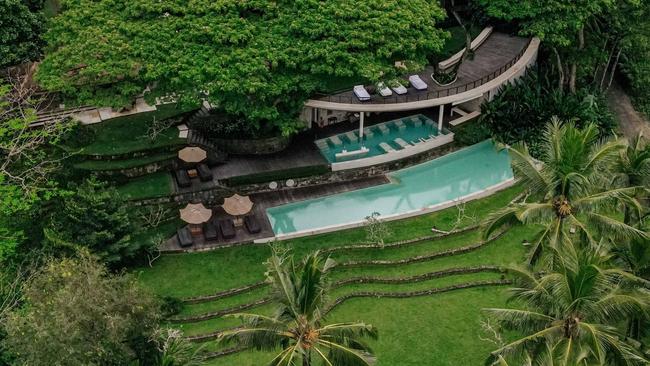
“Modern life can create a void,” Dr Prasanth Vayanakathu, the estate’s Ayurvedic medic, told me. He was seated in his sparsely decorated and serene office overlooking a jungle garden. “As the speed of life increases you need more healing to support you,” he added.
Vayanakathu’s manner was poised and genial. We chatted on Zoom the week before when he peppered me with questions about my sleeping patterns, eating habits and how much water I consumed – nowhere near the exemplary two litres per day. At the retreat, he will inquire about your dreams, observe your breathing patterns and check the flow of your blood in a pulse analysis. All of which informs his “dosha mapping”, or where you sit on the Ayurveda spectrum. It was soon revealed that a couple of my doshas were – cue dramatic orchestral music – out of sync.
“You have a mild excess of two elements – vata and pitta,” Vayanakathu said, prescribing breathwork, massage therapy and dietary advice purported to guide me back to equilibrium.
Cynics might sneer but it made sense to me. And to lots of other discerning types staying at the resort. In the spa’s lavish treatment rooms, guests were relishing signature therapies such as shirodhara, which involves lying supine while a warm oil is streamed onto the forehead to awaken the “third eye”. I had a vigorous massage with an oil specified by Vayanakathu with holy basil, sesame and other Ayurvedic elements to address my dosha status.
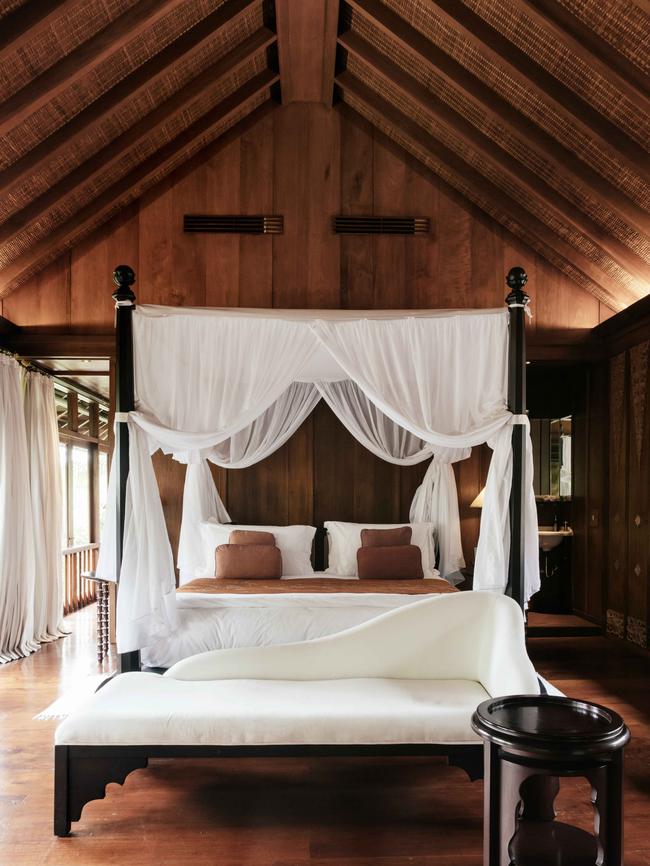
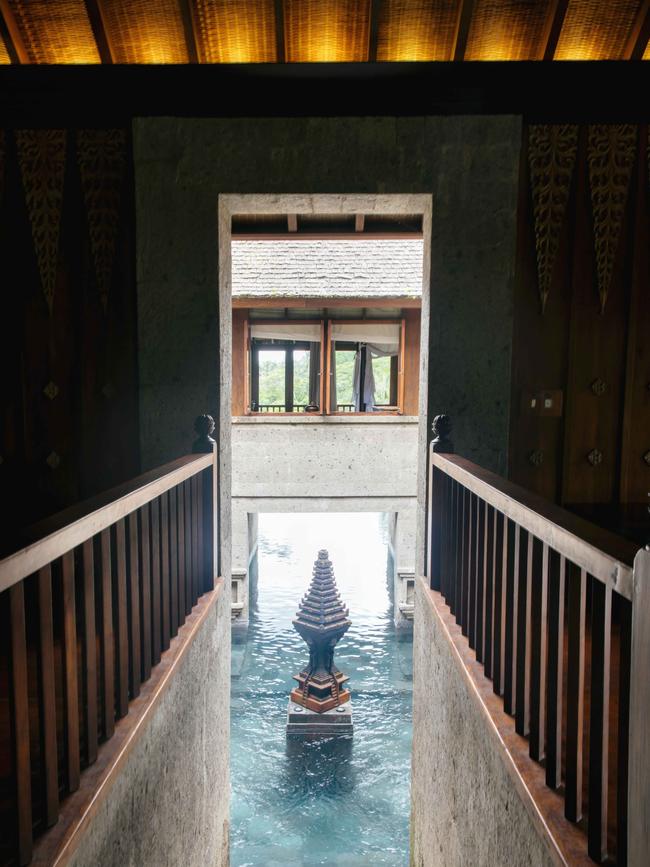
The remarkably skilful masseur applied long, fluid and powerful strokes to alleviate my nagging injuries and flagging energy pathways. He was an assassin on my ailing neck and shoulders, using his forearms in a formidable window-wiper movement. Afterwards, I shuffled to a garden with an outdoor shower and high stone walls. A fragrant exfoliating paste fashioned from chickpeas, sandalwood, coriander and cardamom was so sublime that I requested a bowl for my room.
At Como, you can adjust the asceticism dial to the level you’re comfortable with. I agreed to forgo caffeine, alcohol, and mindless pursuits for my stay. I also decided on a digital detox, placing my devices out of reach. My days were filled with Pilates classes, walks on the estate and visits to the jungle gym. And I experimented with pranayama, Ayurvedic breathing techniques, to respire like an advanced yogi.
“Breathwork is harder than yoga and Pilates because you need to remain still,” yoga guru Monica Troiani advised. Guests hankering for more invigorating pursuits can go hiking in the valley, rafting in the river or cycling through rice paddies with more purpose than a Hollywood heroine. As we raced through Begawan village, chickens dashed across the rocky path, dogs lunged at my wheels and the clamorous gong of a metal device for deterring birds sounded throughout, like a lazy gamelan.
Most guests opt for a customised meal plan informed by their dosha diagnosis, which is efficiently relayed to the two restaurants on the estate. But knowing how exceptional the food would be, I couldn’t abide by any limitations.
Another arrow in Como’s quiver is expatriate Australian chef Amanda Gale. Gale, who ignited her career working with Neil Perry at Sydney’s Rockpool, has acted as the group’s seasoned executive chef for more than two decades. In that time she has elevated nutrient-rich, well-balanced fare to covetable heights. Her sensual, multifaceted dishes centre around protein, plant or meat, and a craveable blend of flavours, textures and raw elements. Eating here is not about lacklustre salads or cheerless açai bowls.
“We develop dishes that are more complex so people don’t feel like they’re missing out,” she told me at open-air Glow restaurant. “We want our guests to feel nourished and satisfied, not deprived.”
Emblematic of her approach were the dishes she prepared for lunch that day: crunchy flaxseed club sandwiches with semi-dried tomatoes, cucumber, avocado and sprouts, a punchy salad of beetroot, lentils and shaved cauliflower, and delicately seared salmon paired with cucumber, cauliflower and chickpeas. On another day, I sampled supercharged bone broth and scrumptious cashew-nut pizza topped with tomato, mango and basil.
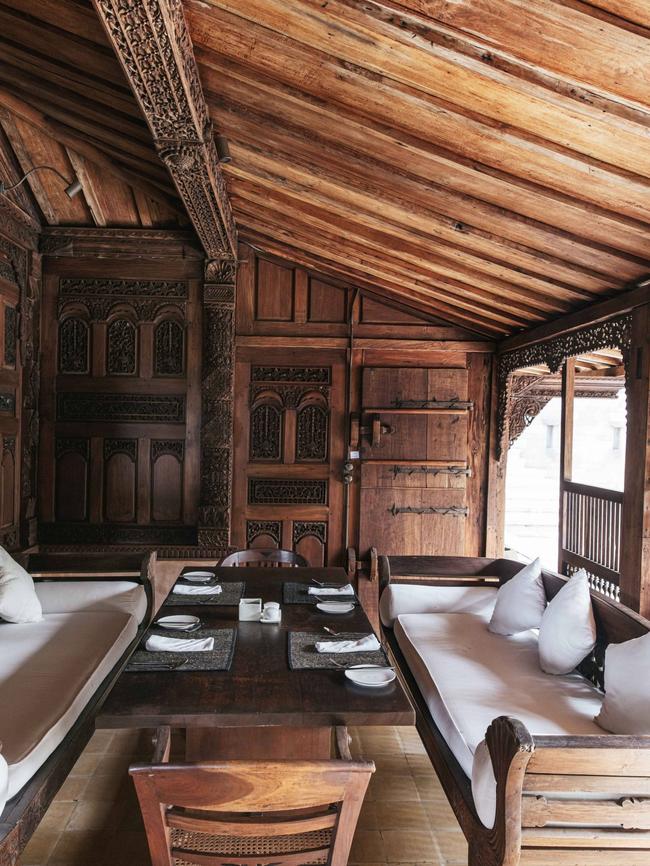
Breakfast was equally imaginative and deeply satisfying. It unfolded at Kudus House, a repurposed 150-year-old Javanese residence with ornate carvings, which is dramatically nestled in the trees. Among the exceptional plates were zucchini waffles, quinoa with poached eggs and mushrooms, and wholemeal pancakes with mango and coconut. There were also Indonesian-accented dishes such as wok-fried red rice with tempeh, vegetables and sambal. Clean-living has seldom tasted so indulgent.
On my last morning, it was apparent not everyone got the serenity memo. A self-regarding Spanish guest was having a conniption over what she considered glacial service. Clearly, she needed to sign up for a Balinese gratitude ceremony, one of the activities on offer, and give thanks for her blessings. Alighting at the estate is not merely about being coddled in countless treatments but the quest for a fresh perspective, a mental breakthrough or insights into your own self-defeating behaviours. Can a retreat holiday deliver a paradigm shift? Maybe.
By the end of my stay, I felt immeasurably better than when I had arrived. I wasn’t even annoyed when a couple in the same residence as mine stumbled unannounced into my villa as I was submerged in a massive outdoor stone bathtub. I neglected to latch the door, so all I could do was wave at the interlopers. Another pivotal moment came in the hydrotherapy pool. Heated to 33 degrees Celsius and equipped with 10 remedial jets, it was both tension-reducing and bliss-inducing. My favourite station was a tap of Brobdingnagian proportions for knotty necks and strained shoulders – they should be available at Reece showrooms.
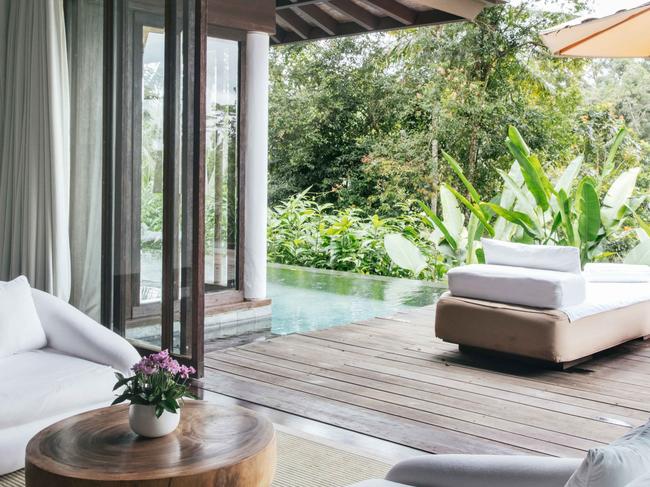
Later, in the gorgeous environs of Como Uma Ubud, a sister property with a moody Italian eatery, splashy bar and flower-laced, jade-hued pool, I toggled between detox and retox. I was still working out and eating well, but the idea of going cold turkey left me cold. “The more natural the wine, the better,” Vayanakathu told me, so I went with his counsel about mindful drinking.
As we surveyed the heliconia-scattered grounds one afternoon, Gede Suteja, the affable general manager of both properties, said the estate is ramping up this year. To strengthen its position as the Olympus of wellness, Como Shambhala is introducing modalities from traditional Chinese medicine, including acupuncture and abdominal massage, as well as technologies such as a hyperbaric oxygen therapy and a sleep hub.
I thought of that sybaritic guest who stayed recently for two months. Her doshas must have been in exquisite alignment.
The writer travelled as a guest of Como Hotels and Resorts. Rates at Como Shambhala Estate start at $800 plus taxes per night. A three-night minimum is required to take part in an integrated wellness program.
Looking to reboot and relax? Discover life-changing wellness retreats and restorative getaways in the latest edition of Travel + Luxury magazine.

